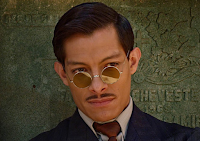Thursday, April 20, 2017
Sunday, April 16, 2017
Hare at Eastertide
See also the previous posts:
• Easter Hare
• Symbol of Enlightenment
• Eostre: Goddess of New Life Beginnings
• The Goddess Ostara
• Remembering Eostre
• Celebrating Eostre
Related Off-site Link:
The Pagan Roots of Easter – Heather McDougall (The Guardian, April 3, 2010).
Image: The Leveret.
Sunday, April 2, 2017
Luis
Luis Alberti is a Mexican actor born October 30, 1981.
After graduating from Mexico City's Casa del Teatro in 2007, he founded with director Damian Cervantes the independent theatre company Vaca 35 Teatro en grupo. The company's experimental activity has lead to plays such as Casualmente (a "collective scenic creation" based on the work of famed novelist Milan Kundera), El loco amor viene, and Uppercut (based on Shinya Tsukamoto's film Tokyo Fist.
From 2008-2009 Alberti worked as a circus performer with the Atayde Hermanos circus while simultaneously studying dramaturgy with fellow actor David Hevia. He would go on to work with Hevia in the 2010-2011 production of the play Por el Gusto de Morir bajo el volcán, based on Malcolm Lawry's novel Under the Volcano.
In 2011 Alberti featured in Daniel Giménez Cacho's TV series Crónica de castas (Caste's Chronicles) and in 2014 he began working in feature films, including Diego Quemada-Diez's La jaula de oro (The Golden Dream), Hugo Carrillo's El lado oscuro de la Luz (The Dark Side of the Light), Marcelino Islas's La Caridad (Charity), and Isaac Ezban's The similars.
His first co-starring role was in Rigoberto Pérezcano's Carmín Tropical, which was awarded as the Best Mexican Feature Film at the 2014 Morelia International Film Festival. The film was also named on the shortlist for Mexico's entry for the Academy Award for Best Foreign Language Film at the 89th Academy Awards, but it was not selected. It was a role that led to a Best Supporting Actor nomination for Alberti at the 2015 Mexican Film Academy's Ariel Awards.
In 2015 Alberti co-starred with Elmer Bäck in Peter Greenaway's film Eisenstein in Guanajuato.
Above and below: Elmer Bäck and Luis Alberti in Peter Greenaway's 2015 film Eisenstein in Guanajuato.
Writes film critic Gary M. Kramer:
Eisenstein in Guanajuato boasts some astonishing visuals as it chronicles Russian director Sergei Eisenstein (Elmer Bäck) in 1930s Mexico, where he is trying to make a film. Instead, his seductive local guide, Palomino Cañedo (Luis Alberti), puts the make on Eisenstein. Cañedo helps the filmmaker lose his inhibitions along with his gay virginity with the help of some olive oil. (Alberti, who plays Palomino, happens to be hung like a horse.)
“Eisenstein was like Dante, going underground in the ‘Divine Comedy’ and meeting Cerberus the dog,” [director Peter] Greenaway observes.
Bäck and Alberti fleshed out Greenaway’s comments for me, chatting via Skype in separate interviews about working with the filmmaker and shooting Eisenstein in Guanajuato’s intense sex scenes.
. . . Luis, why do you think Cañedo seduced Eisenstein?
Luis Alberti: It was like falling in love, I was looking at him and listening to him. That’s what you do when you admire someone and fall in love with them. You want to know about him or her, and you listen to what they have to say. It’s not Palomino Cañedo seducing Eisenstein, it’s Eisenstein seducing Palomino. Cañedo is an innocent in a way. The decision I made was to make this the first time Cañedo falls in love with a man. I don’t know if that’s true with the real man, but I think it was. Eisenstein was a very important director and an amazing person, and his world was very rich, and enjoyable, so that’s how I approached it—falling in love, admiring. Peter talked to me that he wanted it to be like this. It would be dramatic only if Cañedo falls in love for the first time. The real Palomino Cañedo used to have sex with men, but for me it was more interesting if this was his first time.
Elmer, can you discuss how you prepared for all of the copious nudity and sex scenes?
Elmer Bäck: For me, I thought about it at first—especially when you have that amount of nudity. After a day, you don’t think about it. You get used to it. You’re not protecting it and your privacy. It’s not difficult to do. Being an actor, and putting on more pounds and then being naked in a not flattering way, was an interesting way to go into it—to be nude and not in a flattering way. The lack of vanity was freeing. I had to forget about that and just jump in. We were rehearsing—Luis, Peter, and I—and these things are difficult. It works or it doesn’t, this kind of connection. I think we all felt that we were able to play off each other. Because we had to that one intimate scene—you need to allow the other person to be close, and create intimacy—and that comes into the film. As actors, we were going quite far. It was not just for us, but for Eisenstein in that moment. We went through the same thing as actors.
Luis, what are your thoughts about being nude and performing all the sex scenes?
Luis Alberti: We talked a lot about that. I tried to make three faces for Cañedo—one on the street with clothes and hat—very straight and square. The second was indoors, without a jacket and hat, and more relaxed, protected. The third is without clothes, more free, and more like a child. Each face is different; he relates to the environment. We talked about the sex scene for hours. What can we do? How do we do it and make it work? You don’t make a Peter Greenaway film bad. We had to enjoy it and make it enjoyable.
We made the decision to do the sex scene in one take. At the beginning I was concerned about being naked and having a gay sex scene and showing my penis on-screen because of my family and friends, and society—gay things are not always well received by people. This nudity and sex scenes and physicality is very dramatic. Peter Greenaway’s style is very rude about the body and nudity. Everything happens in the flesh. I got the sex scene during the casting so it was clear what was needed from me. I had to process my self-boundaries, and I made the decision to do it.
I think the difficult part of creating these scenes is to accept really wanting to do it. I lived it like this: At first it was “NO I don’t want to do this!” You get scared. But in the process, I discovered I wanted to do it, and as an actor, I always really want to go further, and be free and human and live whatever. That’s why an actor decides to do this, and play difficult, risky things. That was what I discovered. I really wanted to do it. I never thought about it before, but when it came to my decision, I thought—not about the sex thing, but in general — I want to do everything.
Related Off-site Links:
Luis Alberti's Official Website
Luis Alberti's Official Facebook Page
“You Have Naked Bodies and Genitalia, Don’t You? Why Are You So Adolescent?”: Director Peter Greenaway on “Puritan” Americans and the Intense Sex Scenes in Eisenstein in Guanajuato – Gary M. Kramer (Salon, February 4, 2016).
Eisenstein in Guanajuato: Peter Greenaway’s Homoerotic Take on Russian Filmmaker’s Mexican Odyssey – Robert Abele (The Wrap, February 4, 2016).
Sergei Eisenstein’s Coming-Out Party – Armond White (Out, February 5, 2016).
Film of the Week: Eisenstein in Guanajuato – Jonathan Romney (Film Comment, February 4, 2016).
See also the previous posts: Nyle | Philip | Charlie | Sukdeep | Rafael | Mon Bel Ami
Subscribe to:
Posts (Atom)







































